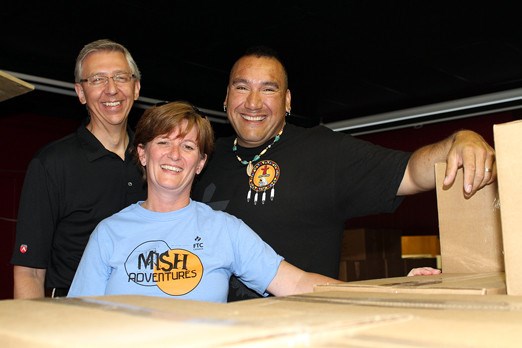Twenty years ago Sky Hedrick was awash in a sea of drug and alcohol abuse, the remnants of the broken home he was raised in the first few years of his life.
A decade or so ago, Hedrick had an epiphany.
Wandering the streets of East Ottawa with little or no purpose in life but finding another fix, he attended a meeting that changed his life, taught him to be proud of who he was, an Aboriginal man with plenty to offer the world.
Today, through his two-year old Eagle’s Cry Life Centre, Hedrick and his wife Angie are delivering that message to others, focusing on fixing a lost generation of single-parent families throughout the North.
"The cycle started being broken through me. My mom was a street person in Winnipeg. She was an alcoholic and a drug addict and I was in the system for the first three years of my life," Sky said.
"So I know what a lot of these people have gone through. I’ve been there and I’ve also found that I can carry on and I don’t have to walk in shame. I did have to work hard to get where I am today, but you know what, I didn’t give up. My heart is not to be a handout, but to stick my hand out to help people up."
Angie Hedrick said the vision of Eagle’s Cry has been with them for many years, because of their past, the troubles they’ve survived through abuse and marital problems, and the eventual reconciliation that emerged.
"With the forgiveness and seeing our family restored, we knew that it was something that is possible for so many families," she said. "We just had a real heart to reach out to those families who have been where we’ve been.
"My husband, being First Nations, has a real heart for his people. This place isn’t only First Nations people, but it is geared there and the majority of the people here are First Nations."
No one who walks through the doors of the Simpson Street drop-in centre is judged, instead they are received with open arms, Sky said.
There’s good reason for that, he added.
"I remember where I came from, and I will not ever look down at anyone below me. My attitude is that I could still be at the bottom and I could still be oppressed. Not a lot of the people who come in are in the same boat. We have families who come in that don’t have a lot, but they contribute to this program too, by offering to cook meals and offering to be a part of it. They volunteer, they help clean up.
"Basically our vision is to see dignity restored and to encourage people and to help them walk along."
Families learn to work and play together, undoing the peer pressure in many Native communities that pit youth against parents.
On Thursday the couple teamed with Feed the Children Canada and handed out boxes of food and hygiene products to 350 families.
It’s just part of what they do, Sky said.
"It’s very important to have a program where we can offer food to needy people in this community," he said. "With the recession, with the issues of unemployment, we really feel that just even helping out with an extra hamper here and there does make a little change in people’s lives.
"It’s not the reason we are down here, but it’s a reason that we can give the children an extra opportunity to maybe have a nutritious snack."
Sign in or register
- Messages
- Post a Listing
- Your Listings
- Your Profile
- Your Subscriptions
- Your Likes
- Your Business
- Support Local News
- Payment History
Registered Users
Already have an account?
New Users
Create a free account.
